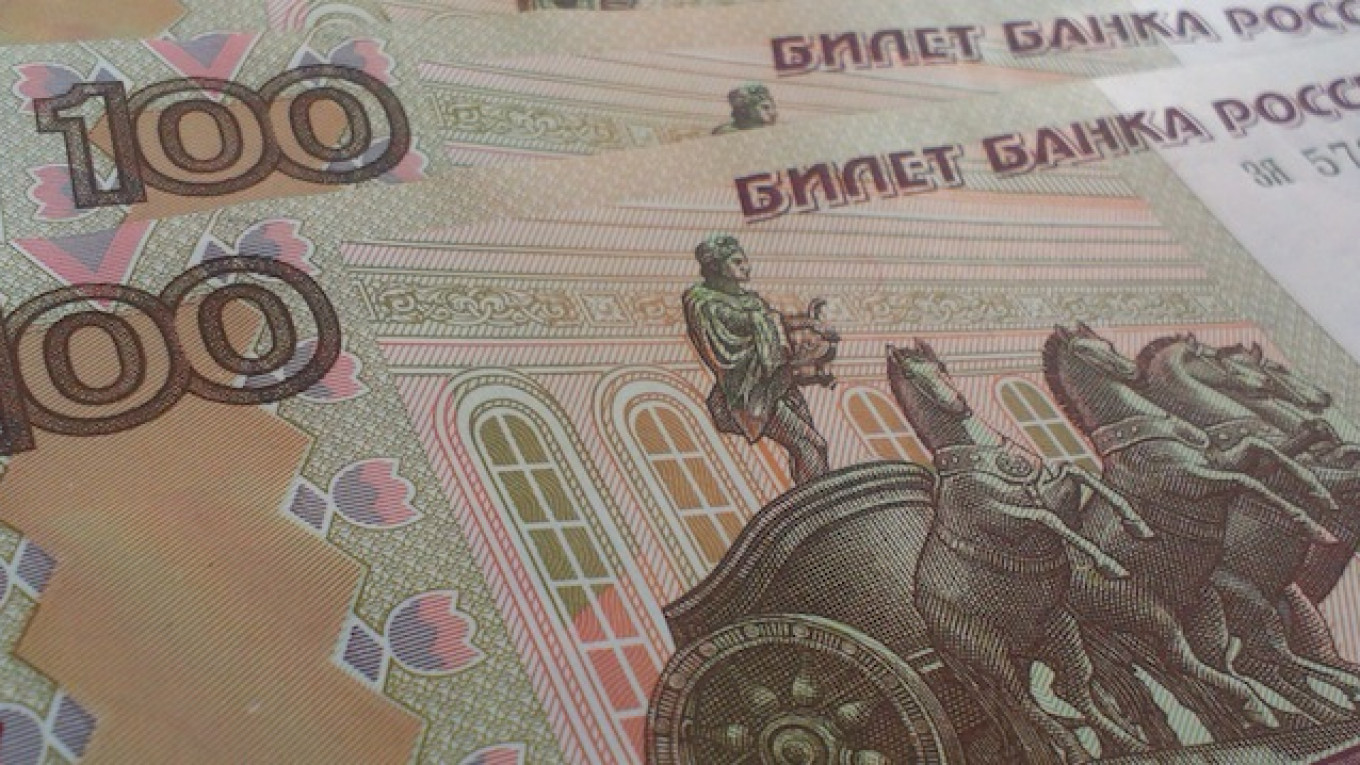A nationalist lawmaker has found elements of pornography on a Russian 100-ruble bill, asking that an image of Greek God Apollo be struck from the banknote in accordance with a law protecting children from potentially damaging information, a news report said.
In his letter to the Central Bank, Liberal Democratic Party lawmaker Roman Khudyakov said the statue of Apollo from the Bolshoi Theater portico showed "intimate parts of the body" and that the banknote should come with an "18+" rating, such as films deemed too explicit for minors, Izvestia reported Tuesday.
Given the likelihood of children setting eyes upon the 100-ruble bill, which is worth about $2.90, Ivchenko argued the banknote should feature something more child-friendly — such as a picture of the Black Sea port of Sevastopol in Crimea, which Russia annexed in March, Izvestia reported.
"As bills of that denomination often get into the hands of children as pocket money, I strongly request your help in changing the design of the banknote or otherwise bringing it into accordance with current legislative regulations," Khudyakov was quoted as saying in his letter, which Izvestia said it had obtained.
The statue of Apollo at the Bolshoi was — to some controversy — covered with a prudish fig leaf when the theater was renovated a few years ago, and Khudyakov noted in his letter that the image on the bill no longer matched its original, the report said.
Lawyers concurred that based on Russia's current legal definitions and codes, the lawmaker may be technically right, Izvestia reported.
"The 100-ruble bill with a picture of Apollo is essentially a print product and can in fact be considered as 'information of a pornographic nature,'" Pavel Ivchenkov, a lawyer from tax and business law firm Nalogovik, was quoted as saying. "That is, it can be regarded as 'information containing a graphic depiction or description of human genitalia.'"
The Central Bank, however, is unlikely to accept the financial costs of replacing such a commonly circulated bill, Ivchenkov added, according to Izvestia.
Changing the design of the supposedly offensive banknote would first require an expert review to be ordered by communication watchdog Roskomnadzor, Izvestia reported, citing Artemy Nikolayev, the head lawyer at Taxadmin.ru business adviser firm.
"Roskomnadzor would make such a prescript [to replace the banknote] only if experts conclude that the banknote contained information that was damaging to the health or development of children" he said, according to Izvestia. "But the probability of that happening is low."
Roskomnadzor declined to comment on the lawmaker's proposal, with a spokesperson saying that banknote design was outside the agency's jurisdiction, Izvestia reported.
Meanwhile, Mikhail Kushnaryov, the deputy chief of Moscow's municipal bar association, said that if experts were to rule that the 100-ruble bill was bad for children, "then school textbooks on human anatomy would also have to be banned," Izvestia reported.
Irina Rapoport, the head of the public council at the Health Ministry's center for medical and social problems of youth, agreed, telling Izvestia that it was perfectly okay for children to set eyes on the Apollo statue.
"I think nothing terrible at all is going to happen if a girl sees the Apollo statue on the bill," she was quoted as saying.
Khudyakov's request to remove Apollo's image from the 100-ruble note comes amid a growing swing to the right in the government's stance toward sexual relations. After the adoption of a law banning the promotion of nontraditional relations to minors last June, lawmakers last month voted to extend the ban to include the promotion of all sexual relations to minors — though the draft bill was eventually defeated.
See also:
Cannes Winner's Lesbian Scenes Banned as Child Porn
A Message from The Moscow Times:
Dear readers,
We are facing unprecedented challenges. Russia's Prosecutor General's Office has designated The Moscow Times as an "undesirable" organization, criminalizing our work and putting our staff at risk of prosecution. This follows our earlier unjust labeling as a "foreign agent."
These actions are direct attempts to silence independent journalism in Russia. The authorities claim our work "discredits the decisions of the Russian leadership." We see things differently: we strive to provide accurate, unbiased reporting on Russia.
We, the journalists of The Moscow Times, refuse to be silenced. But to continue our work, we need your help.
Your support, no matter how small, makes a world of difference. If you can, please support us monthly starting from just $2. It's quick to set up, and every contribution makes a significant impact.
By supporting The Moscow Times, you're defending open, independent journalism in the face of repression. Thank you for standing with us.
Remind me later.






